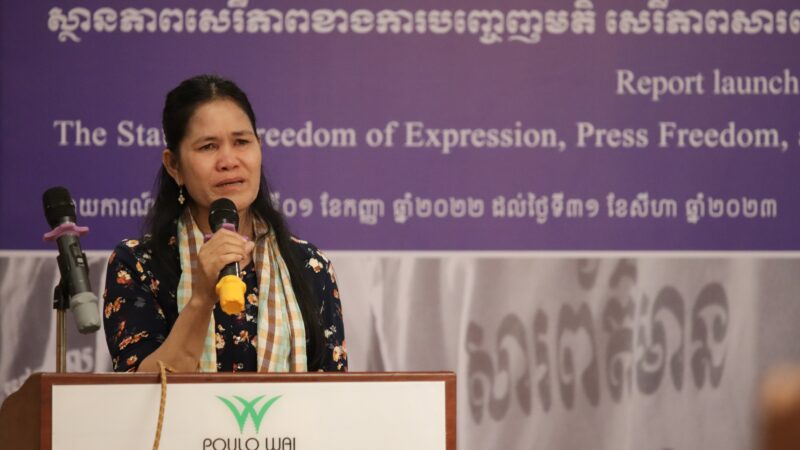
A land rights activist narrates her ordeal after she was persecuted by the government for speaking out on the rights of displaced farmers. Photo from Facebook post of the Cambodian Center for Human Rights. Used with permission.
Despite a change in government in August, Cambodia’s state of freedom of expression remains dim.
After almost four decades in power, Prime Minister Hun Sen stepped down from his position, replaced by his son Hun Manet, who vowed to prioritize peace and stability in the country.
The election's credibility was questionable since authorities cancelled the registration of the major opposition party on a mere issue of technicality. Attacks against independent media, opposition activists, and human rights defenders also intensified ahead of the July election.
The decline of media freedom and free speech in general was highlighted in the latest report of the Cambodian Center for Human Rights (CCHR) which pointed out that the government “continued its worrying trend of over-policing free speech and silencing critical voices, a repression that was exacerbated ahead of the July 2023 general election.” It monitored how state officials filed legal actions against 16 journalists and 100 human rights defenders. It also documented the license revocation of five independent media outlets, including Global Voices’ partner, Voice of Democracy.
The report noted that the repression of free speech has led to self-censorship:
As a consequence of the intimidation, threats and criminal sanctions that journalists must contend with merely for doing their jobs, many media professionals self-censor and avoid publishing information that could anger the ruling elite
Sensitive topics that interviewees said journalists might refuse to cover for fear of repercussions include corruption, land issues, protests, and politics in general.
A joint statement of local civil society groups released in time for the International Day to End Impunity for Crimes against Journalists on November 2 highlighted the grave consequences of harming the safety and rights of journalists.
Targeting journalists – particularly those who are reporting on human rights topics – undermines freedoms of expression and the press, which threatens the public’s access to information. It also makes it harder to hold those in power accountable for their wrongdoing. When authorities fail to investigate and punish perpetrators of crimes against journalists, it sends the message that such offences are permissible.
One of the recommendations in the CCHR report is to allow independent media outlets to freely operate without fear of prosecution.
Encourage media pluralism and diversity by permitting independent media outlets to investigate and report on all issues of public importance without fear of repercussions from the government, to create an open media landscape where divergent opinions and ideas can circulate freely and be accessible to the public.
Aside from undermining media freedom, the government is also accused of silencing human rights advocates.
During the launch of the CCHR report in November, land rights activist Phav Nheung shared how she was unjustly imprisoned for merely showing support to farmers displaced from their lands.
I expressed myself to inform the government in order to have a land solution [for the dispute], but I was charged with defamation and sentenced to 99 days. I will be happy if the human rights laws and treaties are practiced with their principles, so maybe I would not have been imprisoned.
After Hun Manet's rise to power, various rights experts and groups called out the erosion of civic space and democratic rights in the country. Vitit Muntarbhorn, UN Special Rapporteur on the situation of human rights in Cambodia, said that “the hereditary succession to power raised serious concerns with respect to human rights, democratic principles and the international rule of law.”
In a statement submitted to the UN Human Rights Council in September, international civil society groups criticized the harsh policies of the government:
The government has continued a policy of systematic and relentless persecution of human rights defenders, environmental and land rights defenders, trade unionists, political opposition, and independent media and media workers through judicial harassment including mass trials and legal action.
In October, human rights network CIVICUS published its monitoring report, which underscored “that there has been no tangible progress in meeting the benchmarks on civic space.”
A recent example of the disproportionate response to critical perspectives is the sentencing of a Facebook user who faced charges of defamation, incitement and insulting the king after criticizing the ruling party. In an interview with Radio Free Asia, Kang Saran reacted to his court conviction.
Why can’t people express their opinions? Why do you always use arrests and charges like this, even though I have no political affiliation at all?
Exiled opposition leader Sam Rainsy wrote that no substantial change should be expected under the Hun Manet government:
It is useless to look for signs of positive change under a “new regime” when a transfer of power has not in fact taken place. That day will come, as there is no evidence that Hun Manet is capable of governing without his father as back seat driver. When it does, Cambodians will be desperate to take the first opportunity to achieve a transition to democratic rule.
As he marked his first 100 days in power, Hun Manet said the “authoritarian” label does not distract him from focusing on maintaining peace and stability in the country.
I won’t let people accuse the new government of being incapable of maintaining peace for the people, especially because that peace was difficult to attain with great devotion by our nation.



